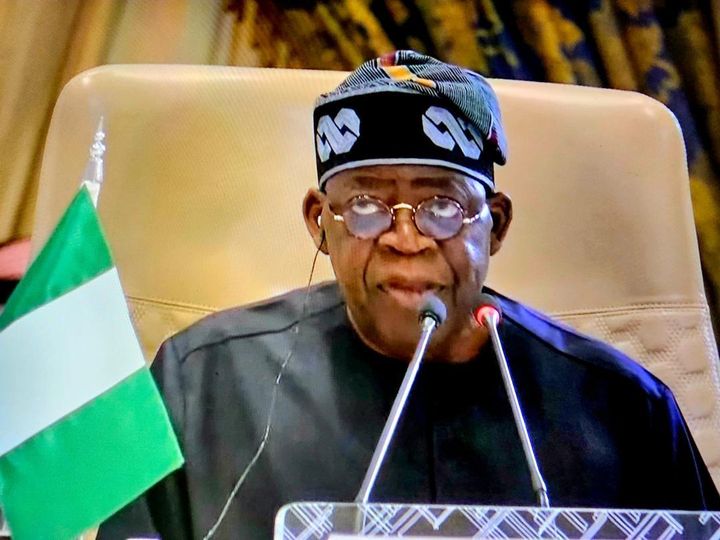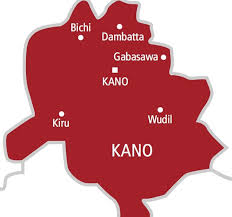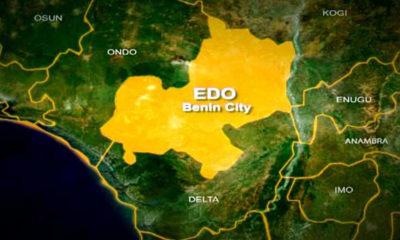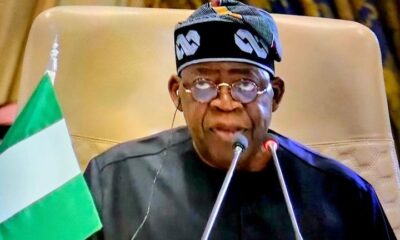NEWS
Tinubu Proposes Two-State Solution To Israeli-Palestinian Conflict

Nigeria’s President Bola Tinubu, on Monday in Riyadh, Saudi Arabia, called for an end to Israeli aggression in Gaza, warning that “the conflict in Palestine has persisted for far too long, inflicting immeasurable suffering.”
This was revealed in a statement by the Special Adviser to the President (Information & Strategy), Bayo Onanuga.
Biztellers reports that President Tinubu was addressing the extraordinary Arab-Islamic Summit, convened with a view to resolving the current situation in the Middle East.
He expressed deep concern about the humanitarian conditions in Gaza.
ALSO READ: Trump Presidency An Opportunity For African Leaders, Says Yemi Adeoye
The one-day summit was a follow-up to the Riyadh summit last year and was attended by Heads of State and Government of the Organization of Islamic Cooperation (OIC) and the League of Arab States.
Reiterating Nigeria’s call for an immediate ceasefire in Gaza, President Tinubu affirmed the country’s support for a two-state solution where both Israelis and Palestinians can coexist in security and dignity.
He noted that this solution remained a viable part to lasting peace in the region.
”The conflict in Palestine has persisted for far too long, inflicting immeasurable suffering on countless lives.
”As representatives of nations that value justice, dignity, and the sanctity of human life, we have a moral obligation to collectively bring about an immediate end to this conflict.
”It is not enough to issue empty condemnations. The world must work towards an end to Israeli aggression in Gaza, which has persisted for far too long.
“No political aim, no military strategy, and no security concern should come at the expense of so many innocent lives,” he said.
The Nigerian leader called on parties in the conflict in the Middle East to respect the principles of proportionality and the basic rights of civilians, consistent with global legal and diplomatic frameworks.
”In a rules-based international order, States have the right of self-defence. But self defence must take proportionality into account, in line with global legal, diplomatic – and moral – frameworks.
”An entire civilian population, their dreams and futures, cannot be dismissed as collateral,” he said.
Explaining Nigeria’s principled and consistent stance on the two-state solution, President Tinubu noted that it stands as a beacon of hope, representing the rights of both Israelis and Palestinians to self-determination and peace.
”It is not just a diplomatic article of faith; it is a vision grounded in the principles of equality and mutual recognition.
”Achieving this vision requires a commitment to dialogue and respect for history. We all know this conflict did not begin on October 7 in 2023. It can only be resolved through principled compromise, based on appreciation of the proper context.
”This conflict, in the cradle of history, is so visceral that the ripples of division spread far and quickly. The corrosive impact of the images of endless violence, repeated on a billion smart phones around the world is huge. We need to find new pathways to peace, without delay,” he said.
The Nigerian leader commended King Salman of Saudi Arabia and Crown Prince Mohammed bin Salman for convening the summit, describing it as a vital opportunity to renew diplomatic efforts and work toward a sustainable peace.
He assured that Nigeria, given its own experiences, would continue to support international efforts that advance peace and stability in the Middle East.
”Our own experiences, domestically and regionally, have taught us that identity politics are no substitute for respecting the nuances of diversity,” he said.
According to President Tinubu ”the path to reconciliation may be fraught with challenges, but it is through honest conversation that we can foster understanding.
”The international community has the opportunity to bring to bear new thinking on this most relentless challenge.
”It is our duty to engage in this dialogue with sincerity and resolve, recognising the complexities that each side faces.”
President Tinubu called for the establishment of a secretariat to implement the resolutions of the Summit.
He urged the leaders to mandate a select group of Heads of Government to canvass support globally and oversee the implementation of the Summit resolutions. These heads would provide regular reports to a joint OIC and Arab League leadership until permanent peace is achieved in the Middle East.
In his opening remarks, Saudi Arabia’s Crown Prince Mohammed bin Salman condemned Israeli actions in Gaza and Lebanon, including the targeting of civilians and the continued violation of the Al-Aqsa mosque.
He also condemned the Israeli ban on the United Nations Relief and Works Agency for Palestine Refugees (UNRWA) from delivering relief aid to Palestinians and the displacement of Lebanese people.
He emphasised the importance of preserving Lebanon’s sovereignty and territorial integrity.
The Crown Prince highlighted Saudi Arabia’s role in promoting Palestinian statehood based on the 1967 borders, mentioning international recognition and the establishment of a Global Coalition with the European Union and Norway.
President Tinubu urged more states to join the Global Coalition.
NEWS
Kano Police Warn Residents Of Imminent Terror Attack Threats

The Kano State Police Command has warned residents of a potential terror attack, targeting public gatherings in strategic locations across the state.
In a statement issued on Friday, the command’s Public Relations Officer, SP Abdullahi Haruna, disclosed that intelligence reports indicated suspected terrorists were planning to carry out attacks.
“The Kano State Police Command, in liaison with other security agencies, has received intelligence reports of suspected terrorists planning to launch attacks on public gatherings in strategic locations within Kano State.
READ MORE: Savannah Energy Provides Unaudited FY 2024 Trading Updates
“In response, we hereby urge residents to exercise caution and avoid crowded places and environments until further notice as a preventive measure to enable security operatives to identify and dislodge possible attackers,” the statement read.
To address the threat, the police command has enhanced security arrangements across the state. SP Haruna revealed that specialized units, including the Explosive Ordinance Disposal (EOD) and the Chemical, Biological, Radiological, and Nuclear (CBRN) teams, have been deployed to strategic locations and are on high alert.
“A team of experts from the command’s Explosive Ordinance Disposal, Chemical, Biological, Radiological, and Nuclear units have been deployed to strategic locations and are on high alert.
“The unit can be contacted through: 08169884988 or 07067157218 for report of suspicious persons or item(s),” Haruna stated.
Residents have been urged to remain vigilant and report any suspicious activities to the nearest police station or contact the command through the designated hotlines.
“The command remains committed to protecting lives and properties as well as maintaining law and order in Kano State.
“We appreciate the support and cooperation of the good people of Kano State and urge everyone to remain vigilant. Your vigilance and cooperation are crucial in ensuring public safety,” the statement concluded.
NEWS
Ifon-Ilobu-Erin Osun Land Disputes: Osun Constitutes A 100-Member Boundary Resolution Committee

In the bid to resolve the incessant land disputes between the communities of Ifon, Ilobu and Erin Osun, the Governor of Osun State, Senator Ademola Adeleke has constituted an enlarged 100-member high powered land crisis resolution committee in which each of the affected communities has 25 representatives, and the state government represented by 25 members.
The Osun State Commissioner for Information and Public Enlightenment, Oluomo Kolapo Alimi made the disclosure in a statement in Osogbo, on Friday.
He revealed that the Ataoja of Osogbo land, Oba Jimoh Adetunji Olanipekun Larooye is the Chairman of the Committee, while a retired judge of Osun State Judiciary and Chairman, Osun State Boundary Commission, Justice Moshood Adekunle Adeigbe, would serve as the Co-Chairman.
According to Alimi, Gov Adeleke put in place the Committee with a view to bringing a lasting end to the incessant land disputes among the three affected communities.
ALSO READ: Leadership Newspaper Backs Adeleke For Second Tenure, Names Him ‘Gov Of The Year’
It was gleaned from the statement that there were four other traditional rulers on the panel, including His Royal Majesty; Oba Abioye Oyebode, the Olokuku of Okuku, His Royal Majesty; Oba Adams Iyiola Bamidele Yusuf, the Oloba of Oba Oke, His Royal Majesty; Oba Adekeye Oyedare, the Oloyan of Oyan and His Royal Majesty, Oba Akeem Ogungbamgbe,The Owaloko of Iloko-Ijesha.
Other members are Umar Abba Mohammed, Osun State Commissioner of Police, Ayoola Kehinde, Osun State Director, Department of State Services( DSS) Brigadier General, Aliu Mohammed, Commander E.C.C, Ede, Sotiyobo Igbalawola, Osun State Commander, Nigeria Security and Civil Defence Corps( NSCDC), Anthony Chikezie, Commander, Immigration Service, Osun State, Adekunle Omoyele, Osun State Commander, Amotekun Corps, and Special Adviser to Osun State Governor on Security, Barrister Dare Ojo.
Also on the enlarged Committee, where members are enjoined by Gov Adeleke to bring in their wealth of experience to bear on the highly critical assignment, are the Chairman, NBA Osogbo branch, Yemi Abiona, Esq; the Chairman, NBA, Ikirun, Niyi Akinsola, Esq; the Chairman, NBA, Ile Ife, Tope Olajoko, Esq; the Chairman, NBA, Ilesha, Raymond Oki, Esq; Others appointed to serve on the Ifon- Ilobu- Erin Osun Peace Resolution Committee are; Soladoye Abioye, the Surveyor General of Osun State – Dr Sodiq Olohunde, Office of Chief of Staff to the Governor, Marufat Adekemi Bello, Permanent Secretary , Ministry of Justice – Femi Ogundun,- Permanent Secretary, Ministry of Local Govt and Chiertincy Affairs, Dr Fritz Mobolaji Olaoye, Permanent Secretary, Ministry of Lands and Physical Planning.
Completing the list of the Committee members are Comrade Wasiu Ajadosu, Osun NUJ Council Chairman, Comrade Waheed Lawal, Osun Civil Society Coalition and Comrade Saka Mao, a Public Affairs Analyst
The statement has it that Gov Adeleke, will on Tuesday, the 28th of January, 2025 perform the swearing in ceremony of the 100-member enlarged Ifon, Ilobu, Erin Osun Land Crisis Resolution Committee, at the Multi purpose hall of Local Government Service Commission, State Government Secretariat, Abere Osogbo by 11:00am.
NEWS
Okpebholo Moves To End Indiscriminate Parking, Gridlock In Edo State

Edo State Governor, Senator Monday Okpebholo, has charged the Managing Director of the Edo State Traffic Control Management Agency (EDSTMA), Engr. Stainless Ijeghede on indiscriminate parking and traffic gridlock, especially in market areas.
According to a statement in Benin City on Friday, by Chief Press Secretary to Edo State Governor, Fred Itua, his principal gave the charge while decorating Ijeghede with his new rank as the head of EDSTMA.
He noted that while addressing the new Managing Director and his personnel at the Exco Chambers in Government House, Gov Okpebholo pointed out that the agency should do its job well by ensuring free flow of traffic across the state.
He called on Ijeghede and men of the agency to ensure they checked indiscriminate parking of vehicles and buses, especially in market areas.
“Edo State belongs to all of us and whatever we are doing, we should do it with care not to harm anybody. I appeal to EDSTMA to ensure that the city is well kept because whenever I drive round town, I see vehicles everywhere as the city is not well kept.
“This is your primary assignment. You should ensure the city is well kept as vehicles park indiscriminately and they are causing obstruction. Traffic is not flowing as it should and it is causing serious gridlock. Is it that you are not doing your job well?
ALSO READ: Leadership Newspaper Backs Adeleke For Second Tenure, Names Him ‘Gov Of The Year’
“Is it that you are not doing your job well or because you have a new leader that is why traffic is not flowing, or because you don’t know your job?
“You people should wake up and keep the state clean. Make sure that vehicles are parked well especially in the market areas. Monitor markets very well as these areas are looking really unkempt with vehicles and buses parked indiscriminately, causing traffic gridlock. Edo people are worst hit. They suffer from this. Ensure free flow of traffic so that the people will be happy,” Governor Okpebholo emphasized.
The EDSTMA boss, thanked Gov Okpebholo for the opportunity to serve the people of Edo State and assured him of the loyalty of the agency.
He added that his men will do their job professionally and ensure that the is free flow of traffic across the state.






















